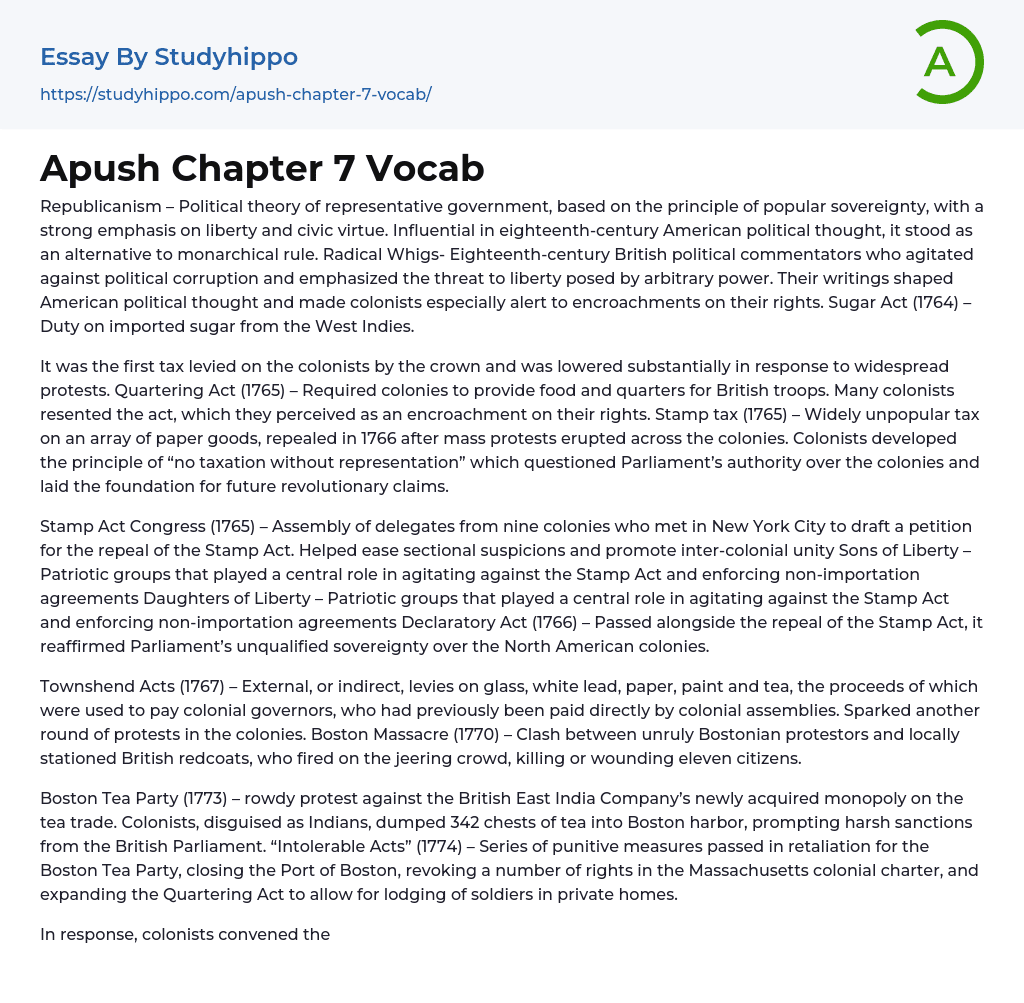Republican theory promotes representative government and is based on the concept of popular sovereignty, emphasizing liberty and civic virtue. This ideology had a significant impact on American political thinking in the 18th century as it offered an alternative to monarchy.
The Radical Whigs were 18th-century British political commentators who actively fought against political corruption and highlighted the threat arbitrary power posed to liberty. Their writings greatly influenced American political thought, causing colonists to be particularly wary of infringements on their rights.
Implemented in 1764, the Sugar Act was a tax placed on imported sugar from the West Indies.
The first tax imposed on the colonists by the crown was reduced significantly following extensive protests. The Quartering Act (1765) mandated that the colonies provide British troops with food and accommodation, an act that many colonists saw as an infringe
...ment on their rights. The Stamp tax (1765), a widely despised tax on various paper products, was revoked in 1766 after widespread demonstrations spread throughout the colonies. The colonists formulated the principle of "no taxation without representation," which challenged Parliament's control over the colonies and established the groundwork for future revolutionary assertions.
The Stamp Act Congress (1765) was a gathering in New York City where representatives from nine colonies came together to draft a petition requesting the repeal of the Stamp Act. This congress helped to alleviate suspicions among different regions and foster unity within the colonies. The Sons of Liberty, patriotic organizations that actively opposed the Stamp Act and enforced non-importation agreements, as well as the Daughters of Liberty, also played significant roles in protesting against the Stamp Act and enforcing non-importation agreements. In 1766, Parliament repealed
the Stamp Act and enacted the Declaratory Act to assert its complete authority over North American colonies.
The Townshend Acts (1767) were external levies on various items such as glass, white lead, paper, paint, and tea. These levies were used to pay colonial governors who were previously paid by colonial assemblies. The Townshend Acts sparked more protests in the colonies. In 1770, the Boston Massacre occurred. This was a clash between unruly Bostonian protestors and British redcoats stationed locally. The redcoats fired on the jeering crowd, resulting in the death or injury of eleven citizens.
The Boston Tea Party in 1773 was a spirited demonstration against the British East India Company's recent control of the tea trade. Angered by this monopoly, colonists dressed as Native Americans disposed of 342 chests of tea into Boston harbor. As a result, the British Parliament imposed severe penalties known as the "Intolerable Acts" in 1774. These measures included closing the Port of Boston, rescinding certain rights granted in the Massachusetts colonial charter, and enlarging the Quartering Act to permit soldiers to be lodged in private residences.
In response to the Intolerable Acts, the colonists gathered for the First Continental Congress in Philadelphia. They formulated a plan called the Association, which urged a complete boycott of British goods. The Revolutionary War began with the Battles of Lexington and Concord, which took place near Boston in April 1775.
The colonial militia managed to protect their munitions, causing the British to retreat to Boston. Valley Forge (1777-1778) was an encampment where George Washington’s under-equipped army endured a harsh and freezing winter. Many soldiers died and over a thousand
deserted. The suffering of the starving and freezing soldiers exposed the primary weakness of the American army, which was a scarcity of consistent supplies and munitions. John Hancock, a wealthy colonial statesman, amassed his fortune through smuggling.
Crispus Attucks was a freedman during the abolitionist movement who was martyred in the Boston Massacre. George III was a good moral man who became a bad ruler. He was earnest, industrious, stubborn, and lustful for power. Additionally, he surrounded himself with cooperative "yes men." Samuel Adams was a rebel ringleader who was sought out by the British during the Battles of Lexington and Concord. Thomas Hutchinson served as the Governor of Massachusetts during the time of the Boston Tea Party.
- Federal government essays
- Armed Forces essays
- Confederate States Of America essays
- Federal Government Of The United States essays
- Fourteenth Amendment To The United States Constitution essays
- Governance essays
- Parliament essays
- Politics essays
- Jurisdiction essays
- Bureaucracy essays
- Separation Of Powers essays
- Congress essays
- President essays
- United States Congress essays
- Non-Commissioned Officer essays
- Appeal essays
- Revenge essays
- Corporate Governance essays
- Public Service essays
- Income Tax essays
- Supply essays
- Red Cross essays
- Democracy essays
- State essays
- Liberty essays
- Absolutism essays
- Reform essays
- Republic essays
- John Marshall essays
- Bourgeoisie essays
- Developed Country essays
- Elections essays
- International Relations essays
- Left-Wing Politics essays
- Monarchy essays
- Political Corruption essays
- Political Party essays
- Political Science essays
- Sovereign State essays
- United Nations essays
- World Trade Organization essays
- Contras essays
- Dictatorship essays
- Foreign policy essays
- Monarch essays
- Corruption essays
- Foreign essays
- Democratic Party essays
- European Union essays
- President Of The United States essays




